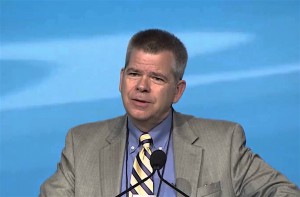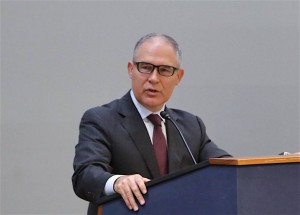
Chris Grundler, EPA director of air quality, is now in favor of easing CAFE rules to improve the working relationship with automakers.
With the federal government expected to soon move to relax tough mileage and emissions standards, a senior EPA official is calling for a less combative approach to working with the auto industry.
That’s a sharp reversal of position by Chris Grundler, the man in charge of air quality at the Environmental Protection Agency. Only a year ago, Grundler said he stood behind the greenhouse gas standards the Obama Administration enacted in 2011 as part of a grand compromise between the government, regulators and the auto industry.
“I think we have a convergence of interests here with the administration’s focus on regulatory reform,” the EPA official said during the annual automotive Management Briefing Seminars held in Traverse City, Michigan. “I think it presents a golden opportunity for us to rethink how emissions get done.”
As a candidate, Donald Trump championed regulatory relief, at one time insisting Washington needed to eliminate two regulations for every new one enacted. He also positioned himself as a skeptic about global warming. Once in office, President Trump quickly met with auto industry leaders who warned him that the Corporate Average Fuel Economy standards approved under the former president would cost a substantial number of U.S. jobs by pricing new vehicles out of the reach of most Americans.
The White House then ordered a reopening of the so midterm review of the Corporate Average Fuel Economy, or CAFE, standards set to rise to 54.5 mpg by 2025. Last week, the EPA floated the possibility of freezing the rules at 2021 levels. In the real world, adjusted for various credits and other factors, that would bring the numbers down to the low to mid-40 mpg range, or about 9 mpg lower than what was originally called for.
EPA chief Scott Pruitt has been one of the Trump Administration’s most vocal forces for regulatory relief, but Grundler’s about-face was particularly surprising in that he forcefully called for holding the CAFE standards unchanged during a presentation at the same industry summit one year earlier.

Scott Pruitt, EPA chief, is expected to push for holding the line on CAFE standards for 2021 instead of the more stringent 2025 requirements.
(Automakers do about face on CAFE standards. Click Here for the story.)
“Last year felt like the ‘Thrilla in Manila,’” a famous Muhammed Ali fight, Mitch Bainwol, CEO of the trade group the Alliance of Automobile Manufacturers, told USA Today. “And this year it feels like we are smoking the peace pipe.”
Ironically, it was Bainwol’s group that just reversed its position on CAFE standards. After pushing for easing restrictions, the alliance found in polling that Americans actually want tougher mandates and the group, which represents a dozen automakers, is falling in line with those efforts.
Despite having backed the strict CAFE rules when they were first enacted, automakers called for their relaxation last year. They pointed to the cost of meeting the rules – analysts generally expecting it would require the extensive use of some form of electrifying most vehicles, whether with hybrids, plug-ins or pure battery-electric vehicles. At the meeting between Trump and the auto industry, former Ford CEO Mark Fields claimed that would price vehicles out of the hands of most Americans and result in the loss of as many as a million U.S. jobs.
Environmentalists quickly disputed those numbers, among other things noting that the auto industry has routinely over-estimated the cost of meeting new regulations.
(Click Here for more about how automakers will be spending big for mobility.)
“It’s not just about the technology. It’s about the market, it’s about the consumers,” said the EPA’s Grundler, during the Traverse City event this week. “You felt that we did not do an adequate job of listening to consumers. You have asked us to do more, and we are doing more.”
The question of how consumers would respond is one of intense debate. Right now, all forms of battery-based vehicles account for barely 3% of the American market. Yet, a study released by the Consumer Federation of America last month found almost eight in 10 Americans wanting to maintain the strict mileage standards passed under Obama – including 68% of Republicans.
It is not clear when a formal proposal on the mileage rules will be issued by the Trump Administration, but some move is expected in a matter of weeks. The other question is how automakers would actually respond to a relaxation. While domestic manufacturers are strongly pressing for a rollback, several foreign brands, notably including Honda and Nissan, have said they intend to move ahead with current plans to boost their own mileage numbers, which will include much more substantial dependence on electrified vehicles.
It should be noted that the EPA would not be the first federal agency to try to strike a more conciliatory tone with the auto industry. During the second half of its latter term, the Obama Administration emphasized the carrot, as much as the stick, when it came to safety rules.
(To see more about Tesla’s latest financial results and what they mean, Click Here.)
Mark Rosekind, former chief of the National Highway Traffic Safety Administration, took steps to encourage automakers to push for new technologies without the need for formal regulations. That included the formation of a precedent-setting consortium that plans to bring automatic emergency braking to virtually all new vehicles by the beginning of the coming decade.
